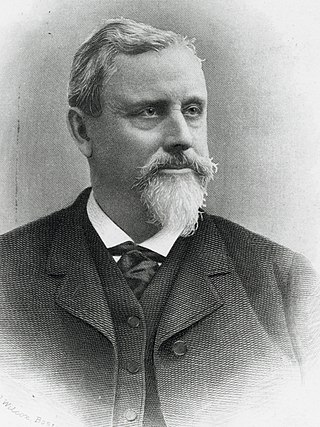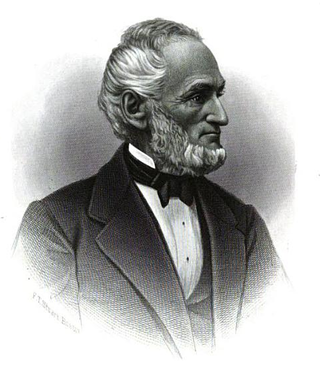| |||||||||||||
| |||||||||||||
| |||||||||||||
The 1827 Boston mayoral election saw the reelection of incumbent Josiah Quincy III to a sixth consecutive term. It was held on December 10, 1827. [1]
| |||||||||||||
| |||||||||||||
| |||||||||||||
| Elections in Massachusetts |
|---|
 |
The 1827 Boston mayoral election saw the reelection of incumbent Josiah Quincy III to a sixth consecutive term. It was held on December 10, 1827. [1]
| Candidate | Votes | % | |
|---|---|---|---|
| Josiah Quincy III (incumbent) | 2,189 | 83.26 | |
| Amos Binney | 340 | 12.93 | |
| Scattering | 100 | 3.80 | |
| Total votes | 2,629 | 100 | |

Hugh O'Brien served as the mayor of Boston from 1884 to 1888. O'Brien is notable as Boston's first Irish and Catholic mayor, having emigrated from Ireland to America in the early 1830s. O'Brien was the editor of the Shipping and Commercial List and served as a Boston alderman from 1875 to 1883. He was chairman of the Boston Board of Aldermen from 1879 through 1881 and again in 1883.

Harrison Gray Otis, was a businessman, lawyer, and politician, becoming one of the most important leaders of the United States' first political party, the Federalists. He was a member of the Otis family.

Linus Bacon Comins was a Massachusetts politician who served as Mayor of Roxbury, Massachusetts and as a member of the United States House of Representatives from Massachusetts from 1855 to 1859.

Amasa Walker was an American economist and United States Representative. He was the father of Francis Amasa Walker.

Nathaniel Bradstreet Shurtleff Sr. was an American politician, serving as the twentieth mayor of Boston, Massachusetts from January 6, 1868, to January 2, 1871.

Levi Cook was an American business and politician who served two terms as the mayor of Detroit, Michigan, and one in the Michigan House of Representatives.
The Boston mayoral election of 1854 saw the reelection of incumbent mayor Jerome V. C. Smith. It was held on December 11, 1854.
The Boston mayoral election of 1855 saw the election of Alexander H. Rice. It was held on December 10, 1855.
The Boston mayoral election of 1860 saw the election of Democratic Party nominee Joseph Wightman. This was the first Boston mayoral election won by a Democratic Party nominee. It was held on December 10, 1860.
The 1868 Boston mayoral election was held on December 8, 1868 and saw Frederic W. Lincoln Jr. be returned to the mayoralty for a fourth non-consecutive term, unseating incumbent mayor Joseph Wightman.
The 1863 Boston mayoral election was held on December 14, 1863 and saw Frederic W. Lincoln Jr. reelected to a fifth overall term.
The Boston mayoral election of 1865 saw Frederic W. Lincoln Jr. reelected to a seventh overall term.
The Boston mayoral election of 1872 saw the election of Republican nominee Henry L. Pierce, who narrowly unseated incumbent Democratic mayor William Gaston.
The Boston mayoral election of 1876 saw the election of Democratic Party nominee Frederick O. Prince over Republican Party nominee Nathaniel Jeremiah Bradlee.
The Boston mayoral election of 1877 saw the election of Republican nominee Henry L. Pierce, who unseated incumbent Democratic mayor Frederick O. Prince.
The Boston mayoral election of 1878 saw Republican Frederick O. Prince elected to return the mayoralty for a second nonconsecutive term. He defeated Democratic nominee Charles R. Codman and Greenback contender Davis J. King.
The Boston mayoral election of 1880 saw incumbent mayor Frederick O. Prince reelected to his fourth overall term, defeating Republican nominee Solomon B. Stebbins.
The Boston mayoral election of 1887 saw the reelection of Hugh O'Brien (a Democrat to a fourth consecutive term, defeating Republican nominee Thomas N. Hart.
The Boston mayoral election of 1893 saw the reelection of Nathan Matthews Jr. to a fourth consecutive term.

The Boston City Charter is a series of State statutes which codifies a system of rules for the government of the City of Boston, Massachusetts. The Charter is not a typical city constitution but rather a series of amendments, General Court rulings, and case law which form the basis of government. The central organs of the Boston City Charter are the Mayoral Office and City Council. The composition of these offices, their term length, manner of election, and scope of power have changed throughout the years.